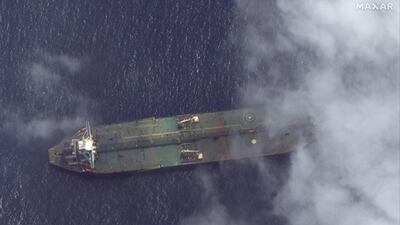Gibraltar leader Fabian Picardo believes it is difficult to say whether Iran breached international rules by selling the Grace 1 tanker oil to Syria.
“It is difficult to see whose word you’d take for it,” he said on Friday.
“You can see from the images that the oil has ended up in Syria but that’s not to say that there’s a breach of the undertaking (by Iran).”
Mr Picardo, caught in the middle of a spat between British authorities and Iran, said detaining the vessel in August was “the right thing to do” because there was evidence it was going to Syria.
“If we had the assurance (that it was not), we would then have an obligation under the law to also let it go,” he told the BBC.
“We did not have an undertaking that the oil would not end up in Syria. We had an undertaking from the Iranian government that they would not sell the oil to any EU sanctioned entity… not just Syria, even entities, some of them in Iran and subject to EU sanctions,” he said.
Dominic Raab, the British foreign secretary, rebuked the Iranian ambassador in London earlier this week for a breach of Tehran’s undertakings not to proceed with a sale to Syrians under sanctions.
British officials claim Iran gave as many as five separate undertaking that it would not proceed with its original sales plan.
"Iran has shown complete disregard for its own assurances over Adrian Darya 1. This sale of oil to Assad's brutal regime is part of a pattern of behaviour by the government of Iran designed to disrupt regional security," he said.
"Iran repeatedly gave assurances to the government of Gibraltar that the Grace 1/Adrian Darya 1 would not deliver oil to any EU-sanctioned entity in Syria or elsewhere.
"It is now clear that Iran has breached these assurances and that the oil has been transferred to Syria and Assad’s murderous regime,” a Foreign Office statement added.
“Iran’s actions represent an unacceptable violation of international norms and the UK will raise the issue at the United Nations later this month.”
When British commandos seized the Iranian tanker, formerly the Grace 1 but subsequently named the Adrian Draya 1, off the coast of Gibraltar, officials were acting on suspicions it was breaking EU sanctions to ship oil to Syria.
The ship was released by the British territory on August 18 after authorities in Gibraltar received written assurances from Iran it would not sell the oil in Syria. The vessel went on to sell the oil there regardless.
“What we’ve heard from the Iranian ambassador is that the national Iranian oil company… did not sell the oil or the vessel to any sanctioned entity,” Mr Picardo said.
While Iran claims to have sold the oil, experts have also cast doubt on Western claims that the cargo has been transferred off the tanker.
In Britain, former Navy chief Adm Lord West and former defence secretary Penny Mordaunt have criticised the handling of the incident involving the British-flagged vessel in June.
Lord West told a commons select committee on defence on Monday that UK actions ahead of the seizure of the Stena Impero had been poor.
“We are responsible. Our Royal Navy, the ships they protect are those that are flagged to the UK,” he said.
Ms Mordaunt indicated her attempts to have the Iranian threat to shipping in the Arabian Gulf addressed by her own government had been ignored. While in office until July, she said she had specifically asked about British nationals aboard ship.
She also expressed specific fears about any mariners who were also military reservists on board vessels passing through the Strait of Hormuz.
While a Cobra committee meeting to discuss events was called, at her request, before the Stena Impero was seized but long after the Grace 1 had been detained and the Fujairah attacks took place.

